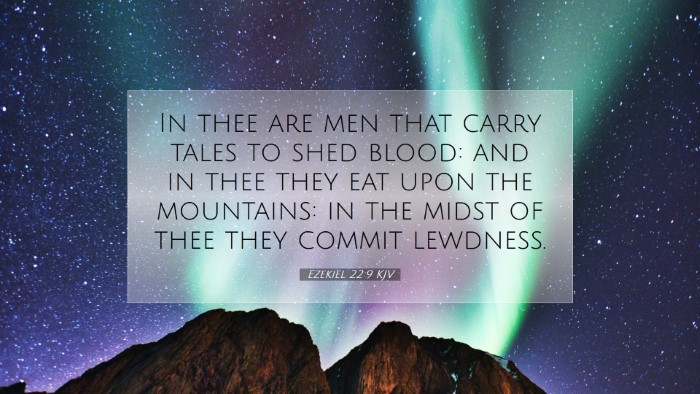Ezekiel 22:9 Commentary
Bible Verse: "In thee are men that carry tales to shed blood: and in thee they eat upon the mountains: in the midst of thee they commit lewdness."
Context and Background
The verse is situated within a dire prophecy of judgment directed at Jerusalem, where God, through Ezekiel, reveals the moral decay and the impending consequence of the city's sins. The chapter depicts the city as a metaphorical furnace, refined to expose its iniquities, particularly those actions of betrayal, violence, and moral depravity.
The phrase "men that carry tales to shed blood" indicates a betrayal among the leaders and people, as those who gossip harm lives and reputations, ultimately leading to violence.
Thematic Insights
This verse encapsulates major themes prevalent throughout the prophetic literature: the condemnation of sin, the call to repentance, and the assurance of God's justice. Here, Ezekiel serves as a mouthpiece for God's lament over Jerusalem, whose sins are as grievous as they are numerous.
The Nature of Sin
- Deception: The acts of carrying tales indicates a society rife with deceit. As Matthew Henry notes, false testimonies and gossip cause chaos and violence within communities.
- Judgment: Both Albert Barnes and Adam Clarke underline that the exposure of these sins is meant as a precursor to divine judgment. The mention of "vile actions" emphasizes that these transgressions demand accountability.
- Moral Depravity: The reference to lewdness highlights a broader issue: the breakdown of moral standards, reflecting a society steeped in idolatry and every form of corruption, a theme throughout Ezekiel’s writings.
Community and Leadership
Ezekiel issues a scathing indictment of the leadership within Jerusalem: the elders, priests, and even the common people are co-opted into this cycle of sin. Barnes emphasizes the collective nature of these offenses, suggesting that the institutionalization of sin renders the entire community culpable.
Practical Applications
For contemporary readers, especially pastors and theologians, Ezekiel 22:9 serves as a grave reminder of the effects of sin both individually and communally. The intents of the heart, manifested in gossip and treachery, echo in modern contexts where rumors can lead to division, strife, and sometimes violence within congregations.
Pastoral Reflection
- Guarding Against Gossip: Pastors must foster a culture of truth and accountability, where gossip is actively discouraged, and relationships are built on trust.
- Addressing Moral Failures: Congregations should be encouraged to confront their moral failures honestly, seeking not only forgiveness but also restoration and healing.
- Community Responsibility: The call for collective repentance should resonate within church bodies, prompting communal prayer and reflection on the state of the church and its witness to the world.
Theological Implications
This verse encompasses broader theological themes that remain relevant today: the character of God as just and holy, the necessity of atonement, and the hope of redemption and restoration. God's judgment is not arbitrary but rooted in divine holiness; thus, it compels believers to strive for righteousness and sanctity in their lives.
The Character of God
As established by Clarke, God's judgment reflects His righteousness and justice. The accusations levied through Ezekiel reveal a God whose concern is not merely punitive but restorative; He desires a purification of His people and their return to a covenant relationship.
Conclusion
Ezekiel 22:9 serves as a powerful reminder of the destructive nature of sin, particularly within the community of faith. The implications of gossip, betrayal, and moral decay are profound, urging modern readers to reflect on their own lives and communities. In light of this scripture, there is an invaluable call to uphold integrity, advocate for justice, and foster an environment of truthfulness and love. The promise of potential redemption lies in acknowledging sin and actively turning towards God with sincerity and humility.


